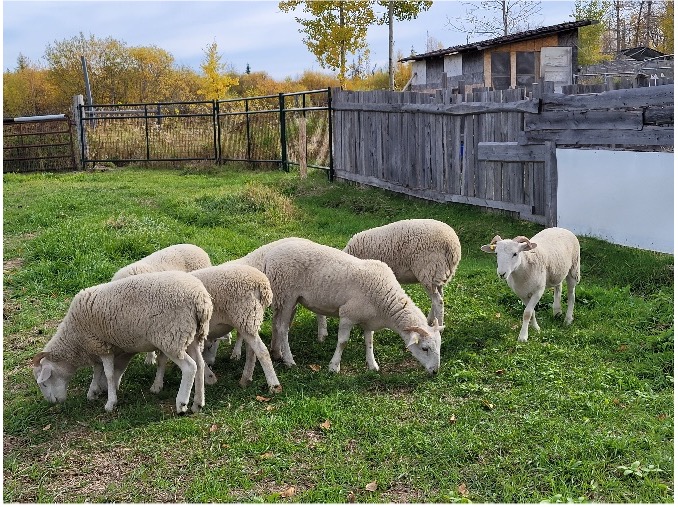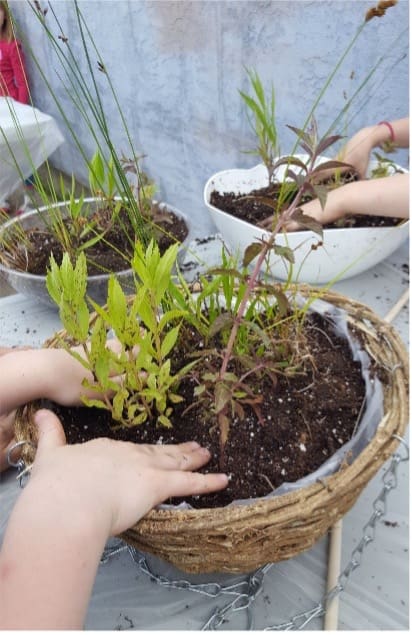
The Flow of Life: Medieval Manor Gardens’ Water Story
Water is more than just a resource at Medieval Manor Gardens—it is the foundation of their farm, their business, and their way of life. Nestled in a region where water conservation and stewardship are crucial, Medieval Manor Gardens has woven sustainability into every aspect of their daily operations. As Dawn Watts so eloquently puts it:
“Water is the life blood of our farm and our business. It is up to us to keep its veins and arteries flowing so that it may continue to sustain us.”
A Unique Approach to Water Management
At Medieval Manor Gardens, water is sourced through a combination of rainwater catchment and well water. The farm has developed a sophisticated system for utilizing rainwater to supply their nursery, greenhouse, and livestock. With gravity-fed rain totes, water trays, and larger storage systems, they ensure that not a single drop goes to waste.
Their approach to water management is highly strategic. Rain catchment barrels and totes are filled and redistributed as needed, particularly during drier periods. Daily routines include watering nursery plants in the morning using gravity-fed systems, while poultry and livestock are supplied with water from stored rainwater. Larger animals such as sheep, donkeys, and horses rely on a combination of stored rainwater and well water, with transportable water totes used to access more remote locations without damaging soft spring ground.
Even wastewater is repurposed. Used water from troughs and totes is not simply discarded but instead irrigates fields, ensuring a continuous cycle of conservation.
Education and Community Engagement
Beyond their practical water management, Medieval Manor Gardens plays an active role in education. They offer nature walks and workshops that highlight the ecological importance of wetlands, showcasing native plants and their rol
e in water filtration, erosion control, and biodiversity conservation.
Workshops such as the Puddle Garden, Wild Tea, Kusomono, and medicinal plant sessions provide hands-on experienceswhere participants learn how native plants can improve water quality, attract pollinators, and contribute to a healthier ecosystem. By fostering these connections, Medieval Manor Gardens hopes to inspire people to take small, actionable steps towards water stewardship in their own backyards.

Challenges and Innovative Solutions
Water has always been a challenge at Medieval Manor Gardens, particularly when it comes to getting water to remote locations and maintaining efficient irrigation for greenhouse plants. Over time, they have developed solutions such as ATV-mounted gravity-fed water totes and battery-operated pumps to ensure livestock in distant paddocks remain hydrated. For their greenhouse, they plan to install an automated watering system in the future, which will reduce manual labor while ensuring consistent irrigation.
Another challenge has been dealing with blue-green algae in nearby Lake Isle, a concern that is exacerbated by agricultural runoff and rising temperatures. Unlike flowing rivers and streams, stagnant water bodies require a proactive approach to maintain quality. Recognizing the role of natural filtration, Medieval Manor Gardens has committed to preserving shoreline vegetation and educating local farmers and homeowners on ways to mitigate runoff pollution.
“Water may have many facets, but it is a connector to all because we all need it. This means it is not optional. We must all do our part to ensure that this resource is taken care of and available not just for now, but in the future.”
Dawn and her team emphasize that small-scale conservation efforts—whether planting shoreline vegetation, reducing fertilizer use, or creating natural filtration systems—can have a significant impact over time.
A Commitment to the Future
Through partnerships with organizations such as Nature Alberta and the North Saskatchewan Watershed Alliance, Medieval Manor Gardens is making a tangible difference in Alberta’s wetland restoration efforts. They supply native shoreline plants for revegetation projects, helping to stabilize banks, reduce erosion, and improve water quality.
Looking ahead, Medieval Manor Gardens is eager to continue expanding their educational offerings, refining their water conservation techniques, and working with more organizations dedicated to sustainable water management. Their story is not just one of a farm but of a vision—one where agriculture and nature coexist in harmony, ensuring a future where water remains abundant and clean for generations to come. You can keep up Medieval Manor Gardens on Instagram here!
The 2025 Alberta Open Farm Days will be taking place on August 16 & 17th. Until then, be sure to follow along on our website and social media channels for all the latest updates, stories, and more!

